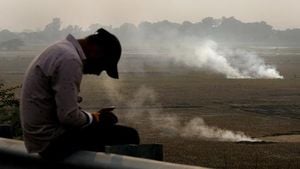On December 12, 2024, Damascus saw the streets filled with mourners as thousands gathered to honor the life and legacy of Mazen al-Hamada, a prominent Syrian activist whose body was discovered at Harasta Hospital. His remains bore signs of torture, emblematic of the brutalities he faced under the Assad regime. Al-Hamada had been well-known for his outspoken criticism of the government during the onset of the Syrian revolution, and his fate has become symbolic of the many activists who have suffered at the regime's hands.
Al-Hamada’s story began during the Arab Spring, when he actively participated in protests calling for democratic reform and the fall of Bashar al-Assad’s government. He paid dearly for his activism, suffering multiple arrests, torture, and eventually fleeing to Europe. Despite these challenges, he courageously returned to Syria, hoping to advocate for those still imprisoned, which tragically resulted only in his own detention upon landing at Damascus International Airport.
The funeral procession was not merely for remembrance but evolved quickly as a rallying call for justice. Participants, many of whom hadn’t dared to protest for over ten years, chanted cries of mourning and defiance as they marched with al-Hamada’s coffin draped in the Syrian flag. Videos circulating on social media captured the poignant scenes as mourners held photos of their own missing relatives, symbolizing both their grief and their fight for justice for all the disappeared.
Throughout the funeral, chants like “We will not forget your blood, Mazen!” resounded, reflecting the communal sorrow and anger over the loss of al-Hamada and the countless others whose names have been lost to oppression. His brother, Saed al-Hamada, poignantly stated, “My brother is now a martyr,” echoing sentiments shared by many who now view him as one of the many victims of the regime’s ruthless suppression.
Al-Hamada's commitment to freedom and justice was recognized not only by his peers but also by international activists. Muzna al-Naib, who had worked closely with him, recalled how deeply he cherished the fight for freedom and democracy, seeing it as worth any sacrifice. She mourned his loss but also honored his contributions, explaining, “He believed with all his heart... but he paid the highest price.”
His path as an activist was fraught with tragedy. After his arrest and mistreatment, al-Hamada escaped to the Netherlands seeking asylum, where he became a voice for those suffering under Assad's rule. His testimony about the torture he experienced became integral to global discussions on human rights violations happening within Syria. Al-Hamada was vocal about his experiences, stating, “I was subject to hanging, sexual abuse, hot oil and boiling water; these were the horrors inflicted upon us.” He believed the international community needed to hold Assad accountable, hoping to arrange systematic changes upon his return.
Returning to Syria against the advice of loved ones, al-Hamada was met with harsh reality. Despite being assured of his safety by government representatives, he was arrested immediately upon his arrival. Since then, his family suffered years of uncertainty until they could finally identify his body, reflecting the agonizing reality faced by many families of missing persons.
The outpouring of grief during the funeral showcased the persistent spirit of defiance among Syrians. Many reflected on the era of silence imposed by the regime, highlighting how astonishing it was to witness open expressions of dissent in public once again. Many who marched hadn’t participated in demonstrations since the early days of the uprising, only remembering the oppression which stifled their voices and hopes.
Activist Sara Afshar, who had collaborated with al-Hamada on efforts to promote justice and human rights, expressed her grief at the manner of his passing. She remarked, “It’s heartbreaking; he dedicated his life to something bigger than himself... the world should not forget his sacrifice.” Indeed, his life and tragic end have together woven him intricately within the narrative of Syria's struggle for liberation.
The large attendance at the funeral denoted more than sorrow; it represented hope and determination. Many participants pledged not just to mourn the loss of al-Hamada and others like him but also to continue the fight for justice. With his death, they did not only lose a hero but also gained renewed vigor to seek accountability for those whose fates remain unknown. Such sentiments are quintessential as Syria embarks on potentially transformative times following the regime's recent upheaval.
The events surrounding al-Hamada's funeral may hold more significance as the world watches how the aftermath of Assad's ousting translates to tangible change for those still seeking freedom. Despite the bloodshed, the resilience of the Syrian people shines through their willingness to re-engage politically, even at such sorrowful moments. With Mazen al-Hamada symbolizing the pain of many Syrians, his life will forever remind people of the urgency for justice and the cost of fighting for change.



